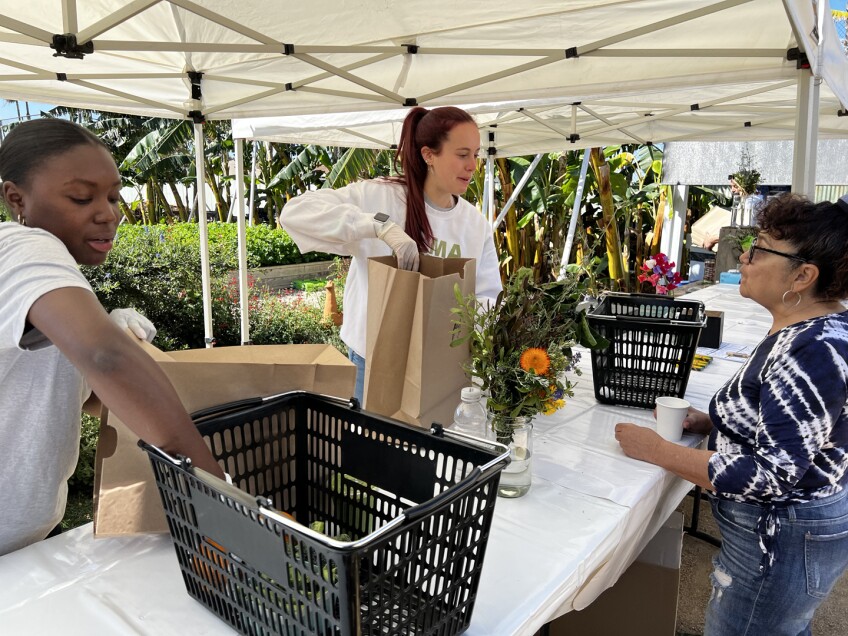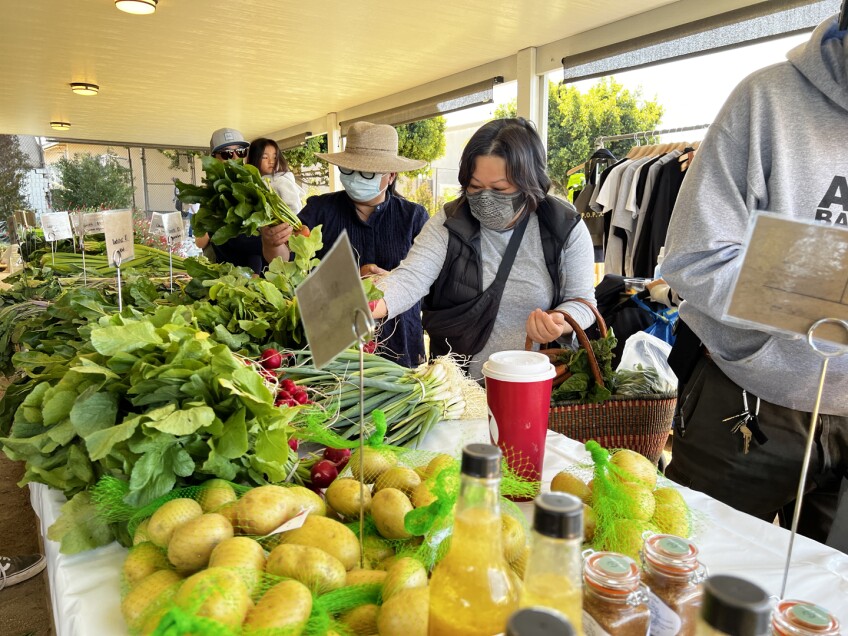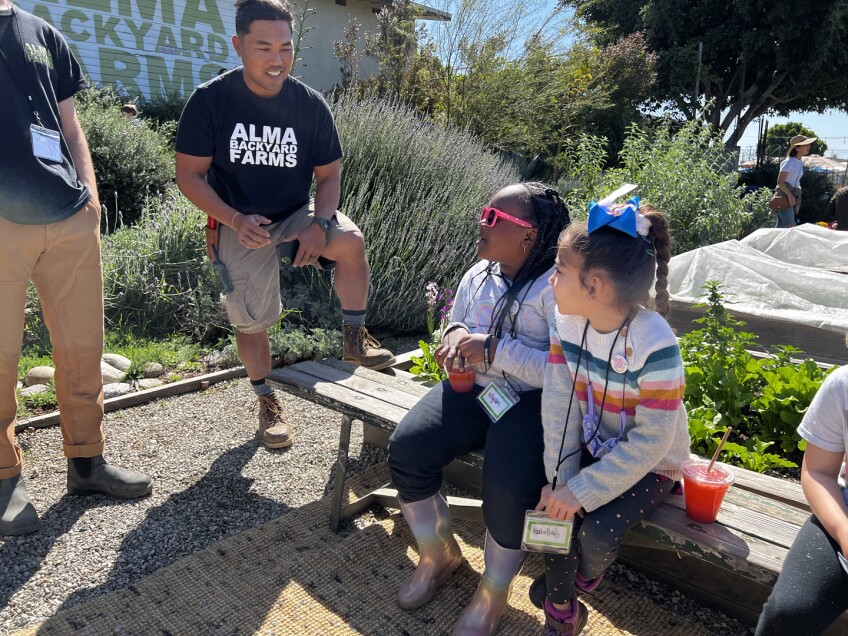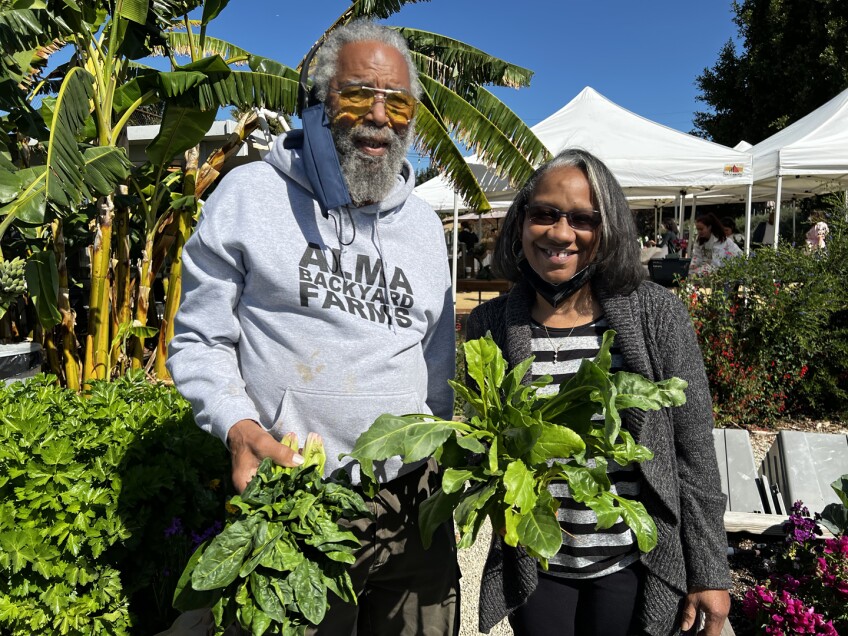Urban Farm Serves Up Fresh Produce and Outdoor Play for Local Families

Cars start to line up along East Redondo Beach Boulevard early on Sunday morning. Families from Compton and all over the Los Angeles area walk through rows of mustard greens and tunnels of seven-foot-tall sweet pea vines. The Penguins' "Earth Angel" plays from an acoustic amplifier hooked up to an iPhone.
The rows of mustard greens and pea vines grow in what was once an empty lot owned by St. Albert the Great Church in West Rancho Dominguez, a community just west of Compton. Now, it's home to Alma Backyard Farms, a nonprofit founded by Richard Garcia and Erika Cuellar. The newlywed couple converted the sprawling 8,000-square-foot space into a children's learning center, a re-entry program venue, and an urban garden with 64 raised beds, banana trees, and more than 30 garden rows.
On alternating Sundays, Alma Backyard Farms opens a farm stand that offers a smorgasbord of organic chards, broccoli crowns, bulbous radishes, collard greens and red and golden beets from Alma and nearby partner farms. There are grocery baskets available, just like at any grocery store.

Cuellar, a co-founder of Alma Backyard Farms, says it's not a regular grocery store, though.
"But people aren't just coming to get their veggies. They're coming to get their dose of community," she says. "They're not just nourishing their palate. It's nourishing so much more."
The farm stand began during the pandemic when volunteers helped the team at Alma Backyard Farms assemble 200 grocery kits with organic produce. According to Garcia, Alma's other co-founder, community members waited for the kits in traffic lines that stretched three-quarters of a mile. Now that Los Angeles County has relaxed masking restrictions, the farm replaced the curbside pickup option has with the farm stand.
"I think we developed a reputation as a good source [of groceries] during the peak of the pandemic," Garcia says. "But I think the human connection, that we kept alive, from the giveaways [and from] getting to know people while they were in their cars."

After shopping, families take their kids to play on the artificial grass in front of the garden.
"These two go crazy out there," says Patrick Furlong, as he watches his two children play. Furlong found out about the farm through his work with students from The Center for Service and Action at Loyola Marymount University, so during the pandemic, he enrolled his 6-year-old son Matthew in the farm's Peas in a Pod class.
"Our Peas in a Pod program is a plant, play and experience-based education that stimulates the senses. The learning is very much a palpable experience," Cuellar says.
It's a monthly, hands-on experience where children can learn how to grow food, harvest it, make compost and cook their own food.
"We hope to instill in young minds the real regard for a healthy relationship with their surroundings, their planet, a real sense of environmental stewardship," Garcia says.
The outdoor classroom motivates kids to interact with animals, such as ladybugs, in the garden and study their habitat. Students are encouraged to survey the relationship between people, plants and insects. While the experience is very hands-on, facilitators use storytelling through music to make farming fun.
On this particular Sunday, Garcia strums an acoustic guitar and sings with the children:
"How do plants grow
How do plants grow
Let us find out
Start with the seeds
Plant in the soil
And let the roots grow
Water and sunlight are just what it needs."
As they progress in the course, teachers reward students with "Alma Bucks" they can redeem at the farm stand to buy organic fruits and veggies. Classes end with a healthy snack and kids are encouraged to expand their palates by eating different varieties of foods, like blood oranges.
Around 400 children have gone through the program. The goal is to have 600 young urban farmers complete the program by the end of 2022. Currently, Peas in a Pod is offered once a month for the general public. But the students of St. Albert the Great Elementary School, which the farm partners with, interact on the farm twice a month.
During Sunday's Peas in a Pod session, 6-year-old Matthew holds a plant moisture sensor in hand while following Cuellar and observing the raised beds. Matthew says he wants to grow up and work on the farm to have his own "walkie talkie." His fascination for the idea grows when he makes quesadillas using fresh ingredients from the farm.
"I don't have a green thumb," Furlong, his dad, says. "He's telling me more about the plants and how they're farmed here, so that was cool to learn from him."

Garcia and Cuellar's love for agriculture started when they were kids, too. Cuellar's parents came to the U.S. from Mexico on their honeymoon.
"They grew up on a ranch where you eat what you grow, and you barter and exchange with neighbors," Cuellar says. She says her family "always had gladiolas, hollyhocks and the flowers growing" that would remind her mother of Cuellar's grandmother and would bring her "that little bit of joy."
Garcia's parents are from the Philippines. He says the family on his dad's side has lots of farming history. His grandfather worked as a farmhand on vineyards in Lodi, California. On the other hand, his mother doesn't (she worked in the emergency room at Kaiser Permanente), but she also had a special connection to plants that inspired her son in unexpected ways.
"I remember the '92 riots. I was in sixth grade when the Rodney King riots happened. She'd come home and water plants because it was one of the most therapeutic things for her to do," Garcia says. "Those memories kind of stuck with me. Maybe that helped introduce me to the ways being tactile and planting and moving dirt kind of helps someone decompress."

Deep Roots in the Community
The land where Alma Backyard Farms sits now served very different purposes years ago.
"This was land that was fallow and overrun by gophers and weeds about hip-high," Garcia says. "Just unutilized."
Cuellar grew up in Watts and played softball on the same land when she was a student at St. Lawrence Elementary School.
"We would always lose against St. Albert [the Great Elementary School]," Cuellar reminisces. "When I first revisited here, it was like, this used to be a softball field, and all these memories of me playing here [surfaced]."
The land is also special to Compton resident Sylvia Torres, who bags freshly harvested arugula at the Sunday farm stand. Torres, who has lived across the street from the church her whole life, has been a teacher's assistant at St. Albert for the past 30 years and a volunteer with Alma Backyard Farms for two years.
"This has been a blessing to our community in Compton. As far as I could remember, I've never seen a farm like this before," Torres says. She remembers what she said to the church's priest when the raised beds were being built. "When they first installed the beds I said 'Aye, father, whatcha doin' over there? Are you makin' the crypts?' You know? It looked like they were going to bury people."
The land is the opposite of fallow now. Besides offering Peas in a Pod and the farm stand, it also provides opportunities for formerly incarcerated people.
Assisting Torres is Armando Padron, a formerly incarcerated team member who has been a farmhand at Alma Backyard Farms since the beginning of the COVID-19 pandemic.
"This place, they helped me a lot," Padron says. "I continue to come back to energy, the spirit, and the people. As soon as I came to Alma, I knew I was in a special place."

In the early days of Alma Backyard Farms, Cuellar and Garcia worked with formerly incarcerated people in transitional housing by helping them install urban farms in their yards to start growing their own food. Then, they hired formerly incarcerated people and offered them training on urban agriculture, including preparing the soil, planting seeds and harvesting and distributing food.
Briley "Journey" Presely-Williams, who got some of that training, compares what she has learned about composting to her life. She grew up west of Compton and has been in and out of jail since 2018. The re-entry program she was a part of serendipitously led her to Alma Backyard Farms.
"It's not just stuff people throw away, but we take it and make good use out of it. We give it some love, churn it, turn it, do what it needs to do, and it grows life," Presely-Williams says. "My slogan here is that I planted so many bad seeds when I was young. It would be great to plant some good seeds, and watch them flourish."
As the farm flourishes, Garcia and Cuellar are planning to rent land in San Pedro to open another urban farm. They don't own any of the land they farm on, but it's an option they are weighing carefully. Garcia remembers someone advising him that there could be power in not owning.
"I think the long-term plan for Alma is land ownership," Cuellar says. "But I agree with Richard that there is power in not owning the land. That's kind of the crazy spirit. You've got to be a little crazy to do any of this."
Families can find more information about Alma Backyard Farms and the Peas in a Pod Program on the Alma Backyard Farms website and Instagram.
